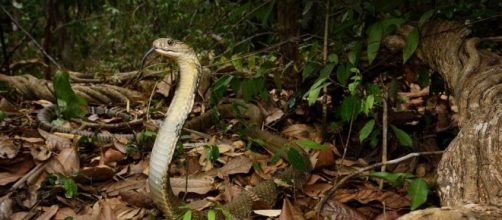Sitting around the campfire on New Zealand’s palm-fringed beach in the Kahurangi National park, a Kiwi friend mentioned that she "could not conceive of a real live snake." Travellers in New Zealand do not need to worry about snake encounters, as there are none outside of zoos. My friend was so afraid of snakes that she refused to visit Africa. She explained that her fear of snakes would only spoil the experience.
Snakes are foreign to urban lifestyles
Africa is not the only place with dangerous snakes, but most people live away from nature as the trends are toward urban lifestyles.
It is doubtful there are too many poisonous snakes roaming the streets of New York or London. When travellers think of Africa, they hope they will see lions, not snakes. They read tips on travel about insect repellent and malaria, crime, and AIDS, rather than tips on snakes.
Keep those zips closed
Not all snakes are dangerous to humans, but if you don’t know what kind of snake is under your camp bed, it may not be the best time to debate species identification. A top tip is to make sure the tent you buy has a fine mesh inner and that all the zips work. Make zipping up your tent a habit. A black mamba slithered between our flysheet and the inner lining in Zululand one day when we were taking a siesta.
Without the zip that mamba would have ended up inside our small tent, and we would have been the losers.
Snakes in trees
Trees harbour snakes that blend in beautifully with the green leaves and the browns of bark and branches. People who are not used to snakes lurking in their orange tree back home need to bear in mind that some snakes not only lurk invisibly amongst the foliage, but are capable of launching themselves out of the tree when they are disturbed. Foraging around trees to collect flowers, seeds, or interesting fruit is inadvisable behaviour.
The dreaded toilet snake
The dreaded toilet snake is not a myth in Africa. In the wildlife parks, toilets are often the favorite hideout of snakes.
They particularly enjoy curling up behind the cistern and around the “S” pipe underneath the toilet. Smaller snakes have been found beneath the toilet lid. Flash hotels and five-star safari camps are probably cleaned well so you need not stress about snakes in the toilet, but campsites are a different story. Always check behind the cistern, underneath the toilet, and under the lid before sitting down.
Snakes in the shower
Reeds often enclose shower facilities in Africa. Reeds look rustic but they are also attractive to snakes. Snakes love to hide in the layers of reeds and wait for passing lizards. Snakes that learn this behaviour can pass it on for generations. In 2001, a vine snake latched onto my jacket sleeve as I undressed.
In 2015, another vine snake in the same shower struck at my husbands’ hat as he walked past. The solution is to beat the reeds with a stick before entering the shower. If you shower with one eye open, don’t feel silly; everyone does it.
Campfire snake encounters
Campfires provide another opportunity to encounter snakes. Wood stacked on the ground looks like a handy hiding place to a snake. Experienced campers will kick at the bundle before picking up firewood. Pick each stick it up with your fingers and bang it on the ground to get rid of stinging insects and small snakes.
Snake magnets
Snake magnet shoes and luggage must not be overlooked. Before you rummage through a pack, check carefully for snakes.
Keep your luggage strapped up and if you leave your boots outside your tent, turn them upside down and bang them on the ground before putting them on. Apart from snakes, a variety of insects enjoy the smell of sweaty feet.
What to do about a snake
Snakes usually take off as fast you do, but call on a campsite official if you are not sure what to do. Snakes are territorial, so sometimes it is best to give up your spot to nature and find an alternative site, especially if the snake is identified as being venomous.

